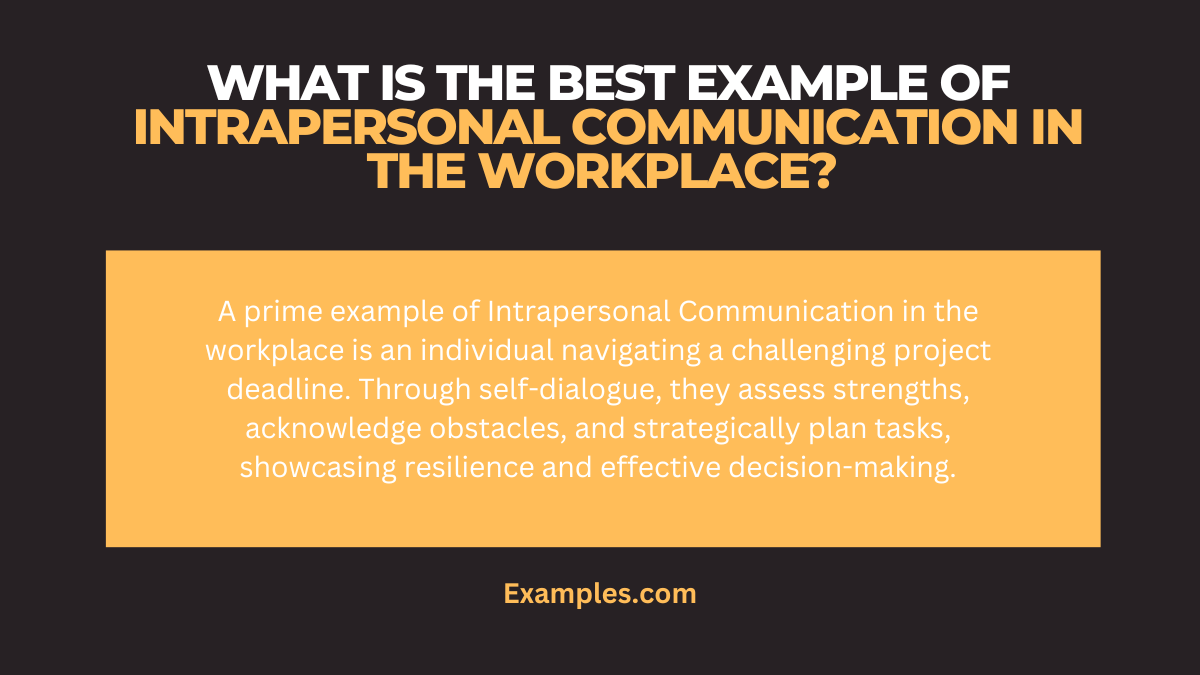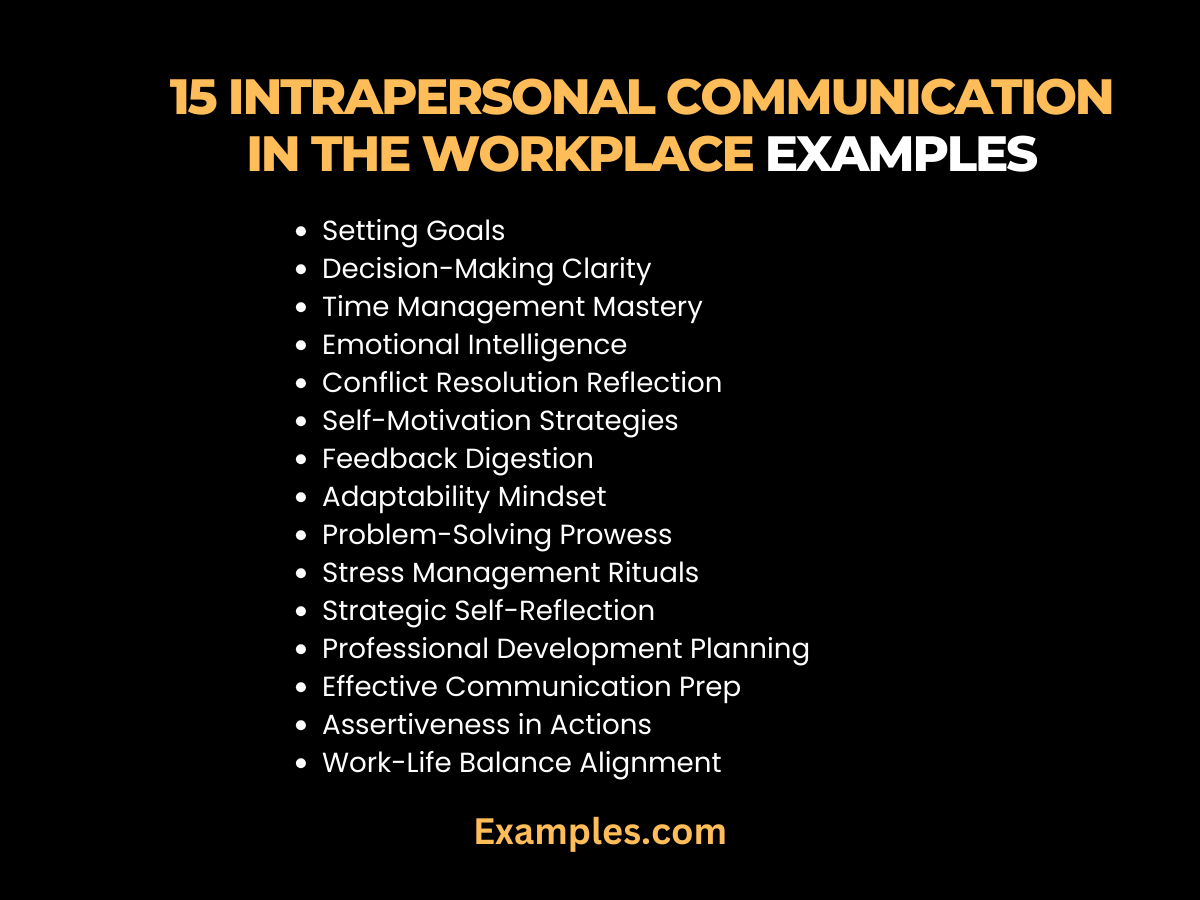Intrapersonal Communication in the Workplace
Unlock the power of Intrapersonal Communication in the workplace with our comprehensive guide. From enhancing self-awareness to mastering effective self-dialogue, this guide is your go-to resource. Dive deep into practical Communication Examples, empowering you to navigate workplace challenges with finesse. Elevate your professional journey by understanding the nuances of Intrapersonal Communication, equipping you with valuable insights and strategies for success. Embrace the art of self-communication and transform your workplace experience.
What is Intrapersonal Communication in the Workplace?

In simple terms, Intrapersonal Communication refers to the internal dialogue and self-talk individuals engage in within the workplace. It involves understanding one’s thoughts, emotions, and reactions, crucial for effective decision-making and self-awareness. This form of communication lays the foundation for a harmonious work environment, fostering personal growth and professional success. Explore the depths of Intrapersonal Communication to navigate workplace dynamics with clarity and confidence.
What is the best Example of Intrapersonal Communication in the Workplace?

In a bustling workplace, a stellar example of Intrapersonal Communication is an individual’s ability to self-reflect and adapt during challenging situations. Imagine a project deadline approaching rapidly. Through internal dialogue, the person assesses their strengths, acknowledges potential obstacles, and strategically plans tasks. This self-awareness fosters resilience, enabling them to stay focused, manage stress, and make informed decisions. Such instances showcase how mastering Intrapersonal Communication empowers individuals to thrive amidst workplace demands.
15 Intrapersonal Communication in the Workplace Examples

- Setting Goals: Boldly envision your career path, aligning personal aspirations with professional objectives for sustained motivation.
- Decision-Making Clarity: In challenging situations, silence the noise, listen to your instincts, and make decisions aligned with your values.
- Time Management Mastery: Prioritize tasks with precision, ensuring efficient use of time and minimizing workplace stress.
- Emotional Intelligence: Navigate office dynamics with emotional resilience, fostering positive relationships and effective collaboration.
- Conflict Resolution Reflection: When conflicts arise, engage in thoughtful self-reflection before addressing issues, ensuring a constructive resolution.
- Self-Motivation Strategies: Ignite personal drive by setting milestones, celebrating achievements, and maintaining a positive mindset.
- Feedback Digestion: Receive feedback with openness, extracting valuable insights for continuous improvement.
- Adaptability Mindset: Embrace change by understanding your reactions, adapting swiftly, and thriving in evolving work environments.
- Problem-Solving Prowess: Approach challenges with a clear mind, dissecting problems and formulating innovative solutions.
- Stress Management Rituals: Develop personalized stress-relief techniques, fostering a balanced and focused professional demeanor.
- Strategic Self-Reflection: Regularly assess personal and professional growth, adjusting strategies to meet evolving career goals.
- Professional Development Planning: Craft a comprehensive plan for skill enhancement, aligning learning goals with career aspirations.
- Effective Communication Prep: Before important discussions, engage in internal dialogue to articulate thoughts clearly and convey messages with impact.
- Assertiveness in Actions: Practice assertiveness, ensuring your voice is heard while respecting the perspectives of others.
- Work-Life Balance Alignment: Harmonize personal and professional spheres by understanding your priorities and setting realistic boundaries
Discover the pivotal role of Intrapersonal Skills in the workplace, essential for personal growth and professional success. Nurturing these skills enhances self-awareness, decision-making, and collaboration, fostering a resilient and harmonious work environment.
- Emotional Resilience Mastery: Develop the ability to bounce back from setbacks, maintaining composure in high-pressure situations.
- Leadership Self-Awareness: Great leaders excel in self-awareness, understanding their strengths and weaknesses to guide effective team management.
- Stress Coping Strategies: Implement personalized stress management techniques, ensuring optimal performance even during demanding work phases.
- Effective Time Management: Master the art of prioritizing tasks, optimizing productivity, and achieving a healthy work-life balance.
- Adaptive Decision-Making: Navigate ambiguity by making decisions that align with personal values and organizational objectives.
What are the Techniques to Boost Intrapersonal Communication in the Workplace?
In a dynamic workplace, mastering Intrapersonal Communication is key to personal and professional success. Explore techniques that empower you to enhance self-awareness, decision-making, and overall workplace effectiveness.
- Mindful Self-Reflection: Begin by cultivating a habit of mindful self-reflection, fostering an understanding of your thoughts, emotions, and reactions in various work situations.
- Goal Alignment Strategies: Align personal goals with organizational objectives, ensuring that your communication and actions contribute meaningfully to the broader success of the team and company.
- Emotional Intelligence Development: Invest in developing emotional intelligence to navigate workplace interactions with empathy, fostering positive relationships and effective collaboration.
- Decision-Making Clarity: Refine your decision-making process by evaluating choices in alignment with your values, promoting confidence and consistency in your professional journey.
- Stress Management Rituals: Establish personalized stress-relief techniques to maintain composure during high-pressure situations, promoting resilience and mental well-being.
- Effective Time Management: Optimize productivity through effective time management, prioritizing tasks, and maintaining a balance between professional and personal commitments.
- Feedback Incorporation: Embrace constructive feedback, using it as a tool for continuous improvement and refining your Intrapersonal Communication skills over time.
- Adaptability Mindset: Develop adaptability by understanding and managing your reactions to change, positioning yourself as a valuable asset in an ever-evolving work environment.
Tips to Improve Your Intrapersonal Communication Skills in the Workplace
Elevate your intrapersonal communication skills with practical tips that promote self-awareness, collaboration, and a positive work environment.
- Active Listening Practices: Cultivate active listening habits to fully understand the perspectives of colleagues, fostering effective communication and reducing misunderstandings.
- Positive Affirmations: Integrate positive affirmations into your daily routine, boosting self-confidence and creating a constructive mindset for improved Intrapersonal Communication.
- Journaling for Clarity: Maintain a work-related journal to document thoughts, challenges, and successes, gaining clarity and insights into your own communication patterns.
- Visualizing Success: Harness the power of visualization to mentally rehearse successful communication scenarios, enhancing your ability to convey ideas with impact.
- Networking Strategically: Engage in strategic networking within the workplace, fostering relationships that support your professional growth and provide valuable insights.
- Conflict Resolution Skills: Equip yourself with effective conflict resolution skills, allowing you to address disagreements diplomatically and contribute to a harmonious work environment.
- Continuous Learning Approach: Embrace a continuous learning mindset, seeking out opportunities to expand your skills and knowledge for ongoing career development.
- Setting Boundaries: Establish clear boundaries to balance your professional and personal life, preventing burnout and promoting long-term success in the workplace.
In conclusion, mastering Intrapersonal Communication is paramount for thriving in the workplace. This comprehensive guide has equipped you with valuable insights, practical examples, and essential strategies. By fostering self-awareness, effective decision-making, and positive collaboration, you are well-prepared to navigate the intricacies of professional life, fostering success and harmonious relationships Elevate your career with the power of Intrapersonal Communication.



